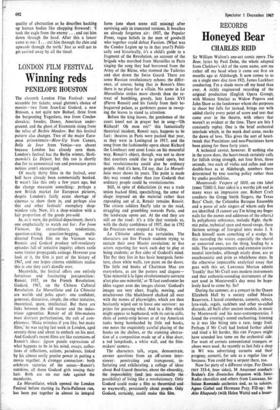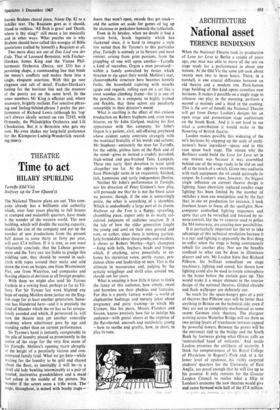Honeyed Bear
RECORDS CHARLES REID
Sir William Walton's one-act comic opera The Bear, lyrics by Paul Dehn, the whole adapted from Chekhov's skit of the same name, sent me rather off my head when it came out first six months ago at Aldeburgh. It now comes to us on a single Haw disc (sent 192), James Lockhart conducting. I'm a shade more off my head than ever. A richly engineered recording of the original production (English Opera Group), with Monica Sinclair as Widow Popova and John Shaw as the landowner whom she purposes to shoot but falls for instead, brings out with added clarity every point of score and text that came over in the theatre, with others that weren't as evident at the time. There are bits I constantly replay. One is the brief orchestral interlude which, in the mock duel scene, marks the dawn of love. This gives the sort of heart- tweak that Puccinians and neo-Puccinians have been pining for these forty years.
A technical caveat, however. If nothing else in the score does, the heart-tweak certainly calls for fullish string strength, not four firsts, three seconds, two each of violas and cellos and one double-bass as at Aldeburgh, numbers there determined by EOG touring policy rather than by studio possibilities.
Monteverdi: Vespers of 1610,- on CBS label (SBRG 72602-3, four sides) is a worthy job and in many ways an impressive one. Robert Craft conducts the Gregg Smith Singers; the Texas Boys' Choir, the Columbia Baroque Ensemble and a posse of solo singers of whom only five are identified. (I cannot say I'm biting my finger nails for the names and addresses of the others.) In polyphonic substance, melodic flight, rhyth- mic pulse, technical span and mood-range, these thirteen settings of liturgical texts make J. S. Bach himself seem something of a stodge. In this recording the voices, especially the choral or concerted ones, are the thing, leading by a mile. The accompaniments and extensive instru- mental interludes, although nicely done, are as anachronistic and prim as whalebone stays. In the otherwise impeccable analytical essay that goes with this set, Lawrence Morton admits 'frankly' that Mr Craft uses modern instruments and that authentic-sounding instruments of the sort used in Monteverdi's day must be hope- lessly hard to come by. So?
During the summer, at a concert in the Queen Elizabeth Hall by a society called Musica Reservata, I beard crumhorns, cornetts, rebecs, lyra-viols, regals, sackbuts and other so-called discards, all built after ancient models, in music by Monteverdi and his near-contemporaries. I found the evening's sound enchanting, listening to it was like biting into a rare, tangy fruit. Perhaps if Mr Craft had looked farther afield and tried a bit harder, this CBS Vespers might have sounded less tame on the orchestral side. For want of comets conventional trumpets or oboes were used. As recently as last July a shop in WI was advertising cornetts and their progeny, cornetti, for sale as a regular line of business. You could buy a serpent there, too.
Now for piety of a different stripe. For Decca (sm. 333-4, four sides), M Ansermet conducts Brahm's EM Deutsches Requiem with. Swiss. Radio choralists and others from Lausanne, his Suisse -Romande- orchestra and, as to soloists, Agnes Giebel and Hermann Prey. Fill-up: the Alto Rhapsody (with Helen Watts) and a lesser-
known Brahms choral piece, Niinie Op. 82 to a Schiller text. The Requiem goes as it should, bland to ruthless. 'All flesh is grass' and 'Death, where is thy sting?' still mean a lot musically and in other ways. What puzzles me is why Brahms should have called this nosegay of Bible quotations (culled by himself) a Requiem at all.
Two more discs are out of Das Lied von der Erde. That of Leonard Bernstein, with Fischer- Dieskau, James King and the Vienna Phil- harmonic Orchestra (Decca, ser 331) has a persisting shape, a commanding line that binds the music's conflicts and makes them into a single, eloquent assertion. With this go rare elegance and salt of detail. Fischer-Dieskau's feeling for the baritone line and the nuances of the poetry are on the same level. In the tenor numbers Mr King is efficient and, where necessary, brightly resilient. For sensitive phras- ing and feeling-behind-phrase I prefer the per- formance of Richard Lewis (although his 'top' isn'•t always ideally secure) on CBS 72545, with Ormandy, the Philadelphia Orchestra and Lili Chookasian. But it is Bernstein who gets my vote. He even shakes my long-held preference for the Kkmperer-Ludwig-Wunderlich record- ing (limy).



































 Previous page
Previous page